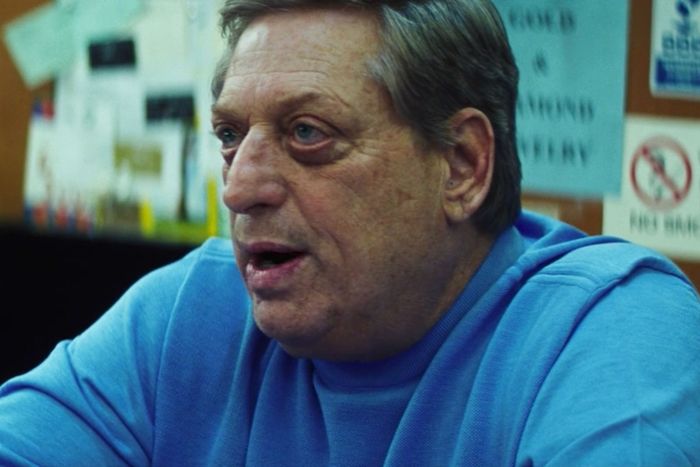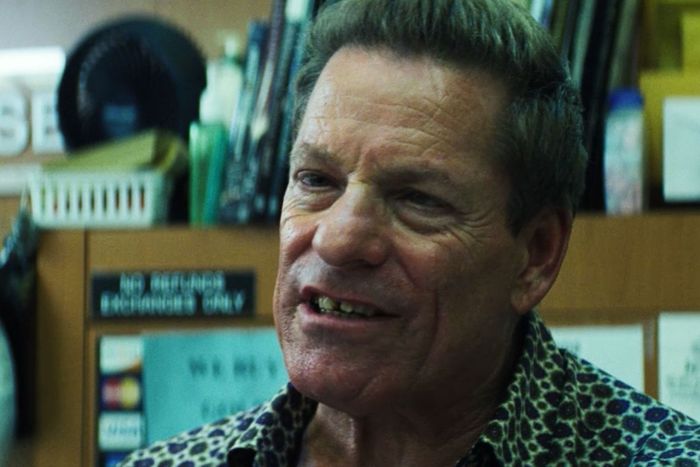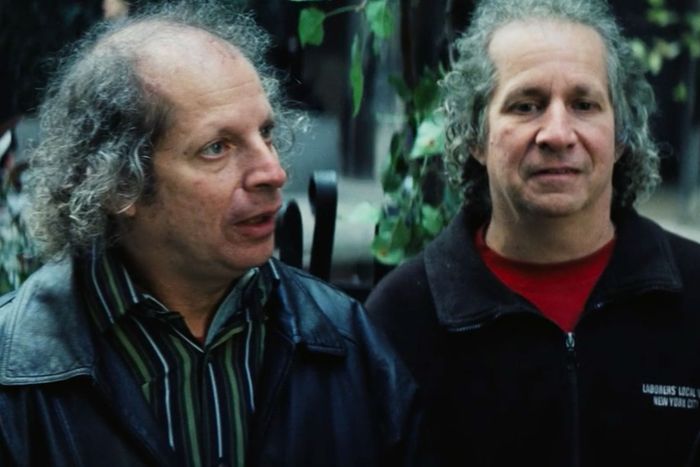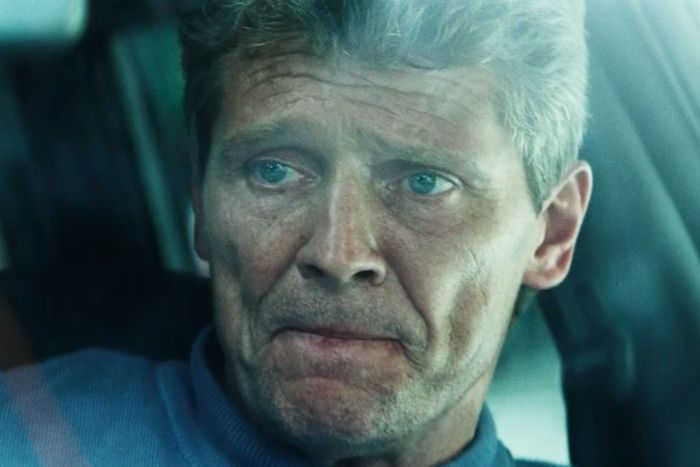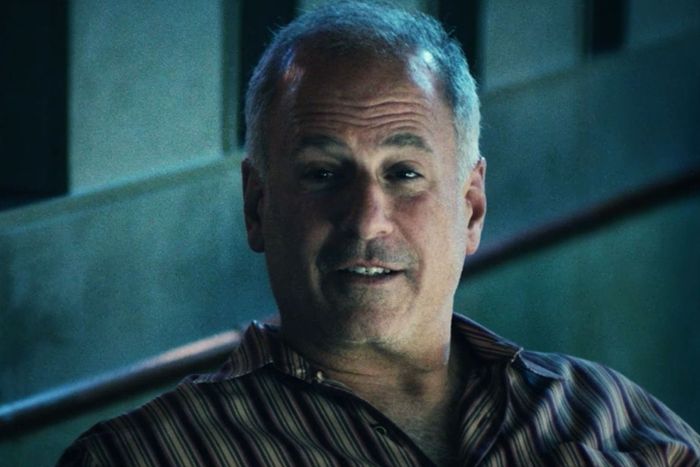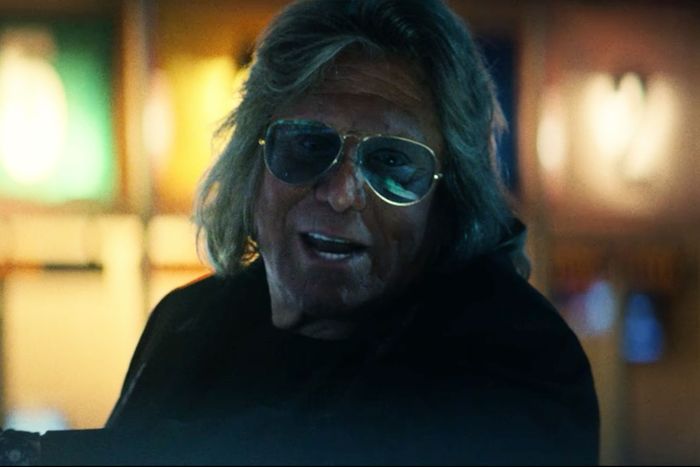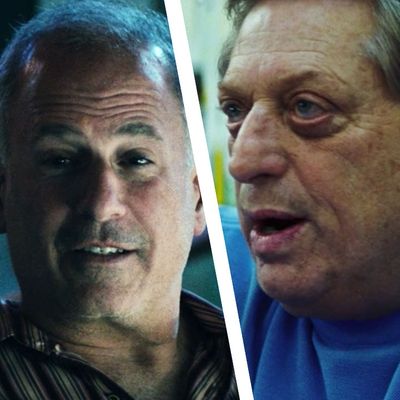
Keith William Richards has a face with a curious familiarity. He just looks like a guy from a movie. Wasn’t he the heavy from a dozen B-gangster films from a decade ago? Or maybe he was in the background somewhere in Thief? When he shows up as an antagonist in Uncut Gems, the Safdie brothers’ crime drama from 2019, his presence sets its own expectation: Howard Ratner (Adam Sandler), the loudmouth Diamond District gambling addict, might not make it out of this one intact. But it’s surprisingly his first film; Richards says he turned down a handful of other onscreen opportunities before getting cast in Josh and Benny Safdie’s 2019 A24 drama. (“I immediately pushed them away each time. For some reason, this time I went with it and everything kind of fell into place.”) When Timothée Chalamet presented the Safdies and co-screenwriter Ronald Bronstein with a National Board of Review award in January, he pointed out Richards’ uniqueness. “That’s not Keith Richards, that’s Keith William Richards,” Chalamet said. “If you’ve never heard of him, that’s because the Safdies literally found him on the street in New York and cast him, like half of the characters in their movies, which sucks for actors like myself with résumés.”
Uncut Gems uses — and subverts — it’s résuméd stars’ appeal, but the movie is built on a handful of first-time actors: Kevin Garnett and Julia Fox, among them. Over the course of a couple days in 2012, Sandler’s Howard runs around 47th Street making money and losing it. There’s something a little romantic about the way the character — and, by extension, the Safdies themselves — navigates this small universe of diamonds and the people who sell them: Deals are made in tiny, weary offices, soundtracked by the buzz of security doors letting buyers in and out, the clack of precious jewels being placed on glass, the cacophony of fussing over a deal. Movie stars seem regular, boring even, next to these people who have been in this world before the cameras showed up, and are still there today. In honor of Uncut Gems’ Netflix debut — a moment months in the making — Vulture spoke to the best of the movie’s civilians, about how they ended up in an indie film about the chaos and magic of their hometown.
Marshall Greenberg
Early in the movie, Celtics power forward Kevin Garnett and his posse visit Howard’s showroom and are immediately entranced by an uncut gem he’s just received from Ethiopia. Garnett becomes fixated on possessing the stone, and so Howard agrees to let the basketball superstar take it for good luck during his next game — in exchange for some collateral. Seconds overlap between Garnett handing his Celtics NBA championship ring to Howard and the jeweler running the ring down the street to pawn for a six-way parlay on Garnett’s game. There, he meets Marshall Greenberg, and his brother Ronald, pawnbrokers who reluctantly accept the ring.
In real life, the Greenbergs have worked on the street for 40 years; Sandler and the Uncut Gems directors spotted the Greenbergs while scouting the district and asked them to be in the film. “[Josh and Benny Safdie] basically asked if I wanted to be in the movie, and I’d never been in a movie,” Marshall says. “My brother was very excited about it. I didn’t know if I wanted to do it or not and what was involved, and so I got to know them and what the part would be and what the movie was about, which I looked into.” (His brother’s version of the story: “All of the sudden Josh and Benny came in with Adam and they see my brother, and within one second they say to Marshall, ‘You have to be in the movie.’ The idea of using the twins, and they’re two brothers who have the same kind of symbiotic relationship, we just hit it off instantly. I felt like they were like my spouse from another generation.”)
Marshall’s mind changed once he became more familiar with the script, and his role. The pawnbrokers pop up twice, both times skeptical of Howard’s self-created chaos. When Howard is his lowest, and most in need of quick cash, Marshall is the only person in the movie to ask him if he’s okay. “We’re both Jewish, me and Ronnie, and there was a very strong Jewish diamond identity [in the movie], which I liked. I think sometimes Jewish diamond dealers get a negative connotation that they’re not so straight and they’re kind of nebbishy. We knew that it was going to create a strong image in general for the industry.”
Marshall loved the movie, and had a positive experience filming. “I’ve gotten a lot of hits on Twitter that were very positive, and the people appreciated it,” he says. “I’m not a publicity person.”
Ronald Greenberg
Marshall Greenberg was skeptical of being in a movie, but Ronald Greenberg needed no convincing. “I was gonna be a film director when I was young. I went to graduate film school at NYU. I actually went to the same class and had the same teacher as Darius [Khondji], our cinematographer,” Ronald says. “I’ve always had a huge affinity for film. I’m a film buff, historian. I studied film, so for me it was like a dream come true to be in a movie about 47th Street.” When he and his brother met Josh and Benny, he says he had a hard time believing the encounter was real. “Someone’s sending me a present,” he thought.
Ronald describes Howard, or “Howie,” as the “kind of good-hearted but despicable, complex, schizoid type.” In scenes with Sandler, this empathy for his character shows; even as Ronald and Marshall are doing a deal with Howard, they’re concerned for him, scared for what he’s greedy enough to do. Like much of the movie, the brothers’ scene was ad-libbed, and the Safdies let them use their real experience on the street to make the exchange feel authentic. “We were making it up on the spot. We’d been doing sales like this, me and my brother. It’s very intuitive for us. We didn’t feel like we were performing. We were doing something we’d done a million times in the past in a million other scenarios.”
Ronald’s girlfriend, Andrea Linsky, also has a small role in the film as Joani, Howard’s showroom’s secretary. Ronald watched her film her scenes on the movie’s set at Gold Coast Studios. “I would go there every night after work and hang out until midnight, so I got very close to the whole cast and crew,” he recalls. “I hope they cast me in another movie. I’m ready to go.”
Mitchell and Stewart Wenig
The Wenigs, another set of brothers the Safdies pulled into the movie, trail Howard throughout the movie, trying to collect on an unrelated bet. The way they pop up announced, when Howard is fretting over much bigger deals, is one of the movie’s greatest gags. The Safdies spotted Mitchell Wenig in a diner eight years ago. “They noticed me eating in a diner downtown in Tribeca with two friends from my prior job, and after me and my two friends were finished eating, they said, ‘How would you like to be in a movie?’” Stewart recalled to Vulture. “And I said, ‘Sure. How about my two friends?’” They said, “We don’t want them. We want you.’” And that’s how Mitchell got a small role in John’s Gone.
For Uncut Gems, the Safdies asked Mitchell to come back and bring his brother Stewart to audition too, a musician who recorded original songs for the movie that didn’t make it into the final cut. “I wrote about ten songs for the movie, and I gave [the Safdies] a CD of the songs. I wrote a song with the title “Uncut Gems.” And the Safdie brothers liked the songs and they like, know how they go and stuff,” he said. “But for some reason they didn’t put them in the movie.”
Read the entire interviews with the Wenigs here.
Keith William Richards
Uncut Gems’ real antagonist is Howard himself, the way he’s willing to walk every tightrope — twice — for the chance at a big score. But it’s Keith William Richards who gets to deliver the final blow to Howard’s ego. The first-time actor was thinking about going back to school to study counseling, waiting at the L train platform at 14th Street when a casting director approached him and asked if he’d be interested in auditioning. “I really didn’t think that this was even gonna work out. So, I just went [to the audition]. I sat down, and there was a line of people.” The casting directors continued to call him back, and finally he was cast as Phil, Arno’s (Eric Bogosian) tough-guy friend ready to rough up Howard.
There was a backstory to their relationship that didn’t make it explicitly into the movie, that the pair met in NA when Arno expressed his troubles with his brother-in-law Howard. Phil is tougher than Arno realizes, though, and once he brings in his partner, Nico (Tommy Kominik), things spiral out of Arno’s control, too.
When I ask Richards about the third act, which he spent trapped in a glass case at Howard’s showroom before shooting Arno and Howard in their heads, he laughs. “[Sandler is] a really down-to-earth guy, a family man. Everything I thought he was, he turned out to be. So, now I gotta put a bullet in this guy’s head and it’s one of my favorite guys in Hollywood!” he recalls. “And now I get to know him, he actually starts to be like a friend. So, it wasn’t easy to do. It really wasn’t. But we had to get it done.”
Over the phone, Richards is sweet and eager to talk. I ask him if he thinks he’s as intimidating as he comes across onscreen. “I guess I can be. I definitely had to be in my past. I mean, I’m 56 years old. I’ve been around. I led a very interesting life, but nothing that should get in the way of me doing the things I do today. So, there’s just a lot I can tap into,” he says. At the Uncut Gems Diamond District popup in January, he says, fans were nervous to approach him. “I am always conscious of my surroundings, so naturally I know when people are looking at me. I try not to look too intimidating or anything like that. I go up to them and go, ‘Listen guys, I’m not gonna kill you. Phil’s home.’ And they laugh!”
Ara Daglian
When Julia Fox arrives at Mohegan Sun, she makes small talk with an unnamed man played by Ara Daglian, a country-club manager in Connecticut and a father who is 56 years old and “single and loving life.” Dalgian met Josh Safdie at Mohegan Sun’s craps table the night before shooting, and Josh convinced him to take the bit part. “People come and go, and sometimes they wanna steal your kidney, sometimes they’re nice people, and sometimes you just don’t know who they are,” he says. He and Josh started chatting, before the director left and returned with Bear-McClard. “I had no idea who these guys were. I see Sebo and I think he’s bringing down the guy who’s gonna hold me down while he’s stealing my kidneys. We’re sort of chatting up, and it’s around 3 or so and I’m like, ‘Guys, I’m cashing out. I’m going upstairs.’ I had had enough fun, and he looks at me and says, ‘I really want you to be in my movie,’ and I said, ‘That’s cool, but my porn days are over. I’ve got a dentist appointment tomorrow.’”
Safdie was persistent, and after Googling the directors, Ara agreed. He arrived to set showered and ready to work, but Josh sent him back to his room. “Josh looks at me and goes, ‘No good. No, no, no. I need you back upstairs wearing in the shirt you wore last night in your 3-o’clock-in-the-morning-craps-table mode.’” Daglian said he returned to his room, and put on the shirt that smelled of “beer and tequila and cigarettes.”
“How often do you respond to a text with just one check-mark emoji?” I ask him. “That’s kind of a flex.” “How many times have I responded to an offer to be in a major-motion picture with a check-mark emoji? I would have to tell you, once,” he laughs. “Not sure what I would do if ever offered again, probably put a check with an exclamation point.”
Wayne Diamond
Wayne Diamond was almost in the Safdies’ previous movie, the Robert Pattinson bank-robbing saga Good Time. We’re talking over coffee, and he’s gesturing wildly as he recalls his almost acting career, punctuating his sentences with Cheshire cat grins. “I really fucked that one up. I don’t know how to read emails. I could show you emails from them, from 2011 to today. Six years of emails for this thing and that thing. When I punch in ‘Sebo’ on the phone, all these things came up,” he says. Sebo — or Sebastian Bear-McClard — is the Safdies’ producer, whom Diamond met at the Spotted Pig in New York City years ago. “I start bullshitting with him. I put his number in my phone as ‘artist’ because I didn’t know what his name was. This really screwed me up! I would’ve been in a lot more shit!”
The Safdies first cast him in a music video after that Spotted Pig meeting, and they called him again for a role in Uncut Gems’ closing bits. In Uncut Gems, the steel-gray-haired Diamond — his skin a few shades darker than Bradley Cooper’s Star Is Born bronze — ends up playing the “Handsome Older Gentleman” that Howard’s girlfriend, Julia De Fiore (played by Julia Fox), encounters at Mohegan Sun as she’s cashing in on the bet Howard placed. He hits on her a couple times before he helps her smuggle the winnings out of the casino, Arno’s henchman in pursuit. (Diamond says that a couple scenes of his were cut, including an extended sequence in a helicopter: “It was freezing in this fucking $6,000 helicopter that we’re in. A piece of shit that looked like it was gonna crash any second, and I got some guy’s feet in my fucking neck!”) The shoot was fast and loose: “Let’s put it this way,” he says, “it’s not like I’m doing Mamet where I have to know every fucking line exactly. Glengarry Glen Ross, those guys really are good, they know everything. This was more like a lot improv, a lot of fun.”
Diamond made his money as a dress designer in the ‘80s. (He dresses plainly, but luxuriously, in black slacks and a black cashmere sweater.) “I’m a retired guy,” he says. “I was a famous dress designer. Now, I’m depressed. I don’t know what the fuck I’m doing anymore. All I did was drink and have fun at The Box.” He doesn’t have a direct connection to the Diamond District, but he’s a character perfectly suited to the Safdies’ style: loud, talkative, freaky, fun. He’d had his own struggles with gambling, which made him even more passionate about the movie. There’s now way to show how he talks — how quickly his brain catapults from topic to topic, the way a conversation about the movie can just lead to him having fun and talking shit — than to just show you:
Vulture: I almost had a feeling that Howard loved winning, but he almost loved losing just as much.
Wayne Diamond: When you’re a gambler, losing is the biggest part of it. Once you lose, you gotta win it back. You’re trying everything to win it back. That’s the action. There’s action all over the place. Look, that guy [Mike] Francesa [who plays Howard’s bookie], nobody liked that guy. I could buy and sell this motherfucker 50 times over. But hey, we’re on a movie set. These are all kids, they’re trying to make a living, they’re trying to do good. He’s walking around in a suit like, “Who the fuck are you?” I mean, give me a break. He was not exactly my kind of guy either.
I don’t like suits. I like the TV show, Suits, but he was kind of weird. He was not a real bookmaker. He sounded good, but that’s not how you deal with your bookmaker. Do me a favor, nobody in the history of bookmaking would ever take a parlay bet like that. I bet parlay with my friend who’s a billionaire, a big bet. Probably the biggest bet I ever made was with O.J. Simpson.
Wait, sorry. Can you go back?
O.J. Simpson was my biggest bet in history.
Can you explain to me what a parlay is?
Parlay is like, “Okay, you’re gonna bet on this horse, then …” It’s almost like the Daily Double, you bet on one horse, then you bet on the next horse. If you win that, you got to triple your bet in the next race, let’s say the third race, you’re betting on that, too. So you’re taking all the winnings and putting it on the next bet.
Okay, got it.
In other words, you’re doubling and then four times-ing. But, the kind of parlay [Howard is] playing, nobody’s gonna bet on this. He’s doing high points. I used to sit with John Salley. We used to talk about it because John’s as straight as an arrow. He’s one of my best friends. O.J. used to bet on things, O.J. was a big friend. Who knows who killed her? I loved O.J. I played golf with him. He was my foursome: Kardashian, O.J. and Bobby, who’s dead.
Okay.
Two of the guys are dead and the other’s eventually dead. I was friendly with the glove thing. I dined with him at Chow’s with my son. The lawyer, what’s his name?
Johnny Cochran?
Every time I think about him, I get tears. This was the nicest guy in the world.
The morning we spoke was the same day the Oscar nominations were announced. Uncut Gems was snubbed in every category. Diamond is furious; people his own age upset him. He likes the Safdies because they’re young, because they have ideas. “I like being with 25- to 45-year-old people. I don’t like old fucking people. They got nothing to teach me. Old people are just complaining all fucking day,” he says. (He declines to reveal his age.) “They all talk like, ‘Oh, how much money I make on the stock market.’ Fuck them. Tell me what else is going on, anything creative? You read anything new lately? Have you read any books? ‘No, no. I made a half a million dollars last week in the stock market.’ I don’t give a fuck, nobody gives a shit.”
Uncut Gems was a masterpiece, he says, and Sandler deserves every Oscar. “People under the age of 50 get this movie. But most people going to the movies are over 50. This is what the problem is,” he says. “Adam Sandler, for what he did in that movie, the guy really got punched in the face! He went through the fucking window in Nino’s! As a matter of fact, we’re having dinner tonight.”



